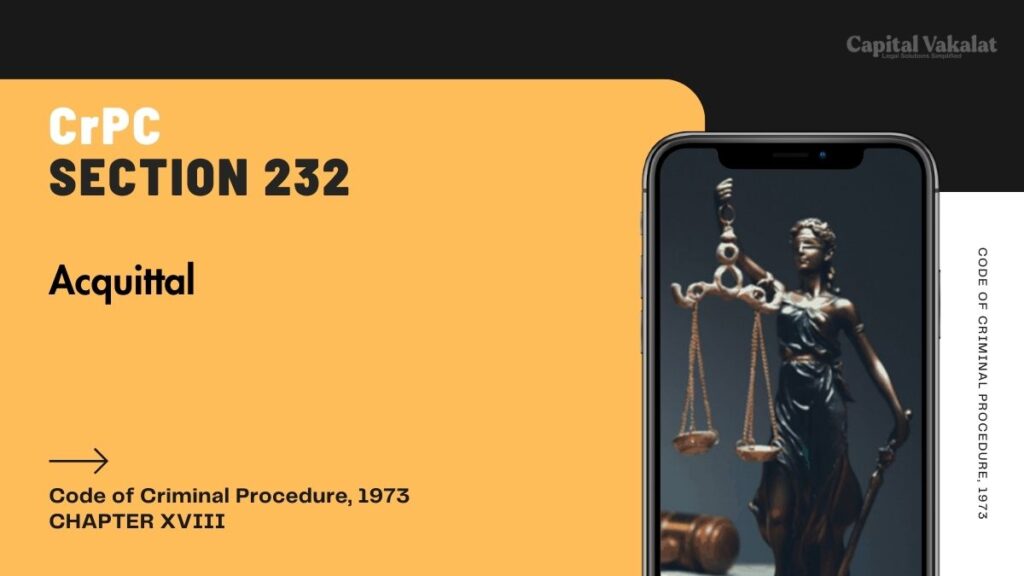In the vast expanse of criminal law, the procedures and provisions laid out in the Criminal Procedure Code (CrPC) of India hold immense significance. Among these, Section 232 stands out as a crucial element that pertains to the acquittal of the accused.

Understanding the intricacies of Section 232 CrPC is essential for legal practitioners, law students, and anyone interested in the judicial process. This article delves into the depths of Section 232 CrPC: Acquittal, elucidating its meaning, procedure, and implications.
Bare Act. Section 232 Cr.P.C.
Acquittal.
If, after taking the evidence for the prosecution, examining the accused and hearing the prosecution and the defence on the point, the Judge considers that there is no evidence that the accused committed the offence, the Judge shall record an order of acquittal.
Understanding Section 232 CrPC
Section 232 CrPC Explained
Section 232 of the Criminal Procedure Code of India provides a procedural safeguard for the accused in a criminal trial. It states that if, after the prosecution has completed presenting its evidence, the judge considers that there is no evidence that the accused committed the crime, the judge shall record an order of acquittal. This section serves as a checkpoint in the trial, ensuring that the accused is not subjected to unnecessary continuation of the trial when there is a lack of evidence.
Historical Context and Development
The provision for acquittal under Section 232 CrPC has its roots in the principles of justice and fair trial. Historically, the criminal justice system has evolved to protect the rights of the accused and ensure that no individual is wrongfully convicted without substantial evidence. The inclusion of this section is a reflection of the judiciary’s commitment to uphold these principles.
Significance of Section 232 CrPC
The significance of Section 232 CrPC lies in its role in safeguarding the rights of the accused. It acts as a filter that prevents weak cases from proceeding unnecessarily, thereby saving judicial resources and reducing the burden on the accused. This provision emphasizes the importance of evidence in criminal trials and reinforces the principle that an individual is presumed innocent until proven guilty.
Procedure for Acquittal Under Section 232 CrPC
Initiating the Acquittal Process
The procedure under Section 232 CrPC is initiated after the prosecution has closed its evidence. At this stage, the judge reviews the evidence presented to determine if there is sufficient ground to proceed with the trial. The defense may also file an application for acquittal, arguing that the evidence is insufficient to support a conviction.
Judicial Considerations and Decision-Making
The judge, upon examining the evidence, must be convinced that there is no direct or circumstantial evidence linking the accused to the crime. If the judge finds that the prosecution’s evidence is weak or lacks credibility, an order of acquittal is recorded. The decision is based solely on the evidence presented by the prosecution, without delving into the defense’s arguments.
Impact of Acquittal Order
Once an order of acquittal is passed under Section 232 CrPC, the accused is immediately discharged from the case. This order is final and binding, and the accused cannot be tried again for the same offense under the principle of double jeopardy. The acquittal brings relief to the accused, ending the ordeal of the criminal trial.
Case Studies and Legal Precedents
Notable Acquittal Cases Under Section 232 CrPC
Several landmark cases have set significant precedents under Section 232 CrPC. One such case is State of Maharashtra v. Laxman Jairam, where the court acquitted the accused due to lack of substantial evidence. This case highlighted the importance of thorough and credible evidence in securing a conviction.
Analysis of Judicial Reasoning
In analyzing judicial reasoning, it becomes evident that the courts are stringent in their evaluation of evidence under Section 232 CrPC. The judgments often emphasize the necessity of solid and reliable evidence to sustain a conviction, underscoring the judiciary’s commitment to justice and fair trial.
Impact on Future Trials
The precedents set by these cases influence future trials by reinforcing the need for robust evidence. They serve as a reminder to the prosecution to build strong cases and ensure that the evidence presented is sufficient to prove the guilt of the accused beyond reasonable doubt.
Challenges and Criticisms
Challenges in Implementing Section 232 CrPC
While Section 232 CrPC is designed to protect the accused, its implementation faces certain challenges. One significant challenge is the subjective nature of evidence evaluation. Judges must exercise caution and ensure that their decision is based on a thorough and unbiased assessment of the evidence.
Criticisms and Counterarguments
Critics argue that Section 232 CrPC might sometimes lead to the acquittal of guilty individuals due to technicalities or insufficient evidence. However, proponents counter that this risk is a necessary trade-off to prevent wrongful convictions and uphold the principles of justice.
Balancing Rights and Justice
The debate around Section 232 CrPC ultimately revolves around balancing the rights of the accused with the pursuit of justice. Ensuring that only the guilty are convicted while protecting the innocent from wrongful conviction is a delicate balance that the judiciary strives to maintain.
Conclusion
Section 232 CrPC is a crucial provision in the Indian judicial system that underscores the importance of evidence in criminal trials. It serves as a safeguard for the accused, ensuring that no individual is subjected to unnecessary trials without substantial evidence. While its implementation faces certain challenges, the provision plays a vital role in maintaining the balance between justice and the rights of the accused. By understanding and appreciating the nuances of Section 232 CrPC, we can better appreciate the complexities and safeguards embedded in the criminal justice system.